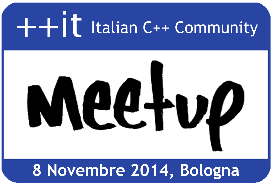28 C++ User Group Meetings in November!
The monthly listing of the upcoming C++ User Group meetings brings a new record in November: 28 User Groups are meeting so far:
C++ User Group meetings in November
by Jens Weller
From the article:
Meetings in November4.11 C++ UG OC Qt - Qt Developer Days 2014 San Francisco
4.11 C++ UG Warsaw - "Co nowego w C++14"
5.11 C++ UG Saint Louis - First official meeting for our group
5.11 C++ UG Austin - Austin C/C++ Boost Double Feature
6.11 C++ UG Malmö/c++ folk - LLVM/Clang on Windows
8.11 C++ UG C++ Italy - Italian C++ Community Meetup Bologna
8.11 C++ UG Pune, India - C++11 Move Semantics and STL optimizations + A look at LibreOffic
12.11 C++ UG Utah - Efficient Parsing with Boost.Spirit
12.11 C++ UG San Francisco/ Bay area - Presentation and Q&A
13.11 C++ UG NRW/Aachen - C++ User Gruppe (November)
13.11 C++ UG Dresden - TDD
13.11 C++ UG New York - Experience with C++11 in ArangoDB
17.11 C++ UG Juce - JUCE Meetup Helsinki
17.11 C++ UG Denver - Denver Tech Center C++ Developers
17.11 C++ UG Austin - North Austin Monthly C/C++ Pub Social
18.11 C++ UG Chicago - Highlights of the Standards Committee Meeting
19.11 C++ UG Düsseldorf - Treffen der C++ User Gruppe NRW
19.11 C++ UG Santa Barbara - Brett Hall will give a talk on Transactional Memory and C++
19.11 C++ UG Seattle/NorthWest - Debugging, Profiling, and Diagnostics for C++ in Visual Studio vNext
19.11 C++ UG Hamburg - C++14
20.11 C++ UG Juce - JUCE Meetup Paris
20.11 C++ UG Bristol - Save the date
25.11 C++ UG Montpellier - Meetup C++ novembre
26.11 C++ UG San Francisco/ Bay area - Workshop and Discussion Group
26.11 C++ UG London - monthly MeetUp
27.11 C++ UG Rhein-Neckar - C++ Usergroup Meeting
28.11 C++ UG Istanbul - Debugging with GDB
29.11 C++ UG Russia - Novosibirsk Meeting


 ACCU 2015 is now putting together its program, and they want you to speak on C++. ACCU has long had a strong C++ track, though it is not a C++-only conference. If you have something to share, check out the call for papers.
ACCU 2015 is now putting together its program, and they want you to speak on C++. ACCU has long had a strong C++ track, though it is not a C++-only conference. If you have something to share, check out the call for papers.  From the CppCon blog:
From the CppCon blog: